Happiness

January Must-Reads: Top 10 Articles From Last Month
How a tidal wave of potential changes at the federal level could throw many programs planners depend on into chaos, a roundup of last year’s zoning stories, and the continuing ripple effects of a landmark Supreme Court case.
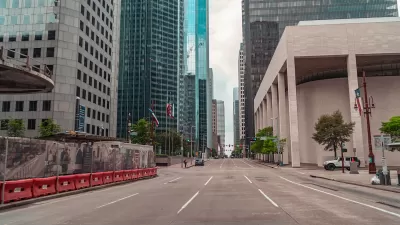
Research Links Urban Design and Human Happiness
An emerging field of ‘neuroarchitectural’ research is revealing how building facades and urban design impact the human brain and body.

How the Built Environment Affects Your Mood
Humans have survived for millennia by staying together, not apart.
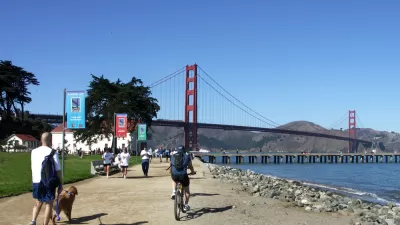
City Dwellers Happiest in Parks, Angry at Transit Stops
An analysis of geotagged tweets reveals that city dwellers express positive emotions in green spaces and restaurants, while bus stops and transit elicited more frustrated reactions.
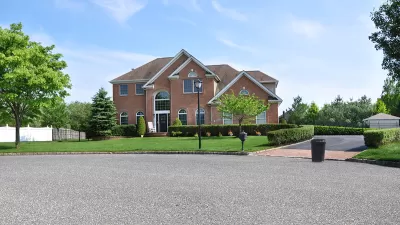
Study: A McMansion Can't Buy Happiness
As houses grow and households shrink, many Americans have a lot more space to themselves. But recent research says they aren't any happier trying to keep up with Joneses.

The Automobile as Prison. The City as Freedom.
The automobile has been pitched as a machine for freedom, but travelling inside a small metal box, strapped to a chair, forced to focus on the road while your life is threatened by two-ton projectiles doesn’t sound like freedom to David Levinson.

As Canadian Cities Grow, Survey Finds Happiest Canadians are in Smaller Communities
The happiest people in Canada, according to a survey of life satisfaction, tend to live in significantly less dense communities than the least happy.

What Kind Of Commute Makes People Happy?
The conventional planning wisdom seems to be that long drives are less beneficial to well-being than a short walk. But what about other commuting options?

Urban Sanity: Understanding Urban Mental Health Impacts and How to Create Saner, Happier Cities
Some experts claim that city living causes mental illness and unhappiness, but a new study indicates that urban environments provide many mental health benefits. Better planning can help make sane and happy cities.
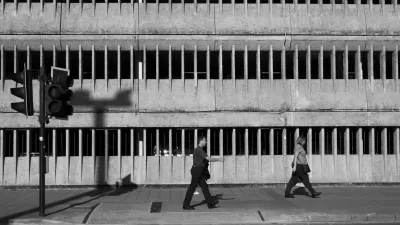
A Critique of the Built Environment: How We Built Unhappiness
One writer's view of the modern city goes negative. If our environment affects our happiness, surely we're all suffering from depression.

Measuring Well-Being in Santa Monica
The beachfront town known for its surfers and celebrities is collecting data that dig deeper than traditional measures of economic prosperity, and the results may be surprising.
Highlights from CNU 23 Dallas
Having just wrapped up a great CNU in Dallas, April 29 through May 2, a collection of urbanists share some of the ideas that resonated the most.
Zen and the Choice of Commute Mode
A new study found that commuters opting for active travel modes and rail are more satisfied with their commute than those who take bus, metro, or drive.

Mapping the Happiest Places in the United States (Disneyland Not Included)
Researchers from Harvard and the University of British Columbia used "self-reported life satisfaction data" from the Centers for Disease Control and Prevention to locate the cities and regions where Americans are most happy (or unhappy).
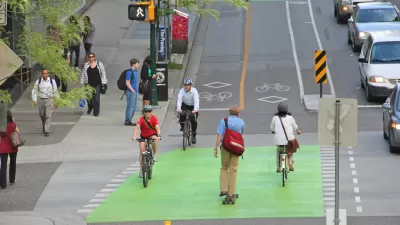
Freedom of Mobility is the Key to Happiness
Cities designed for one type of mobility - the car - result in residents impaired by multiple types of ailments. To create a happier and healthier city, the solution is to facilitate many ways of getting around, especially alternatives to the auto.
Want Happiness? Live Near Transit
According to a study by U. of Minn's Jason Cao published in the journal, Transportation, there is a positive correlation between living near light rail transit and satisfaction with life. He based it on the Hiawatha light rail line in Minneapolis.

What Makes Nordic Countries So Happy?
The second United Nations' World Happiness Report shows that the world is becoming a happier place with 60 of the 130 countries analyzed improving. What is going on in the 30% of countries, including the United States, where happiness is declining?
Pursuing the 'American Dream' Can Be a Real Downer
Tight housing inventories, rising prices, and conservative mortgage lenders are preventing many would-be homeowners from buying their piece of the 'American Dream'. Michelle Higgins explains why this may actually be a good thing.

High Density Means More Economic Growth and More Happiness, Too
Using new analysis of recent US Census data, Richard Florida demonstrates that “[c]ities and regions where density is more concentrated near their urban cores — appear to gain the biggest economic advantage.” That, and a tad more happiness.
Does Urbanism Correlate with Happiness?
Planning policies related to the economy and environment are easier to measure, but Hazel Borys asks, "how do we measure national happiness, well-being, and social capital as they relate to the way we plan our neighborhoods, towns and cities?”
Urban Design for Planners 1: Software Tools
This six-course series explores essential urban design concepts using open source software and equips planners with the tools they need to participate fully in the urban design process.
Planning for Universal Design
Learn the tools for implementing Universal Design in planning regulations.
planning NEXT
Appalachian Highlands Housing Partners
Mpact (founded as Rail~Volution)
City of Camden Redevelopment Agency
City of Astoria
City of Portland
City of Laramie


































